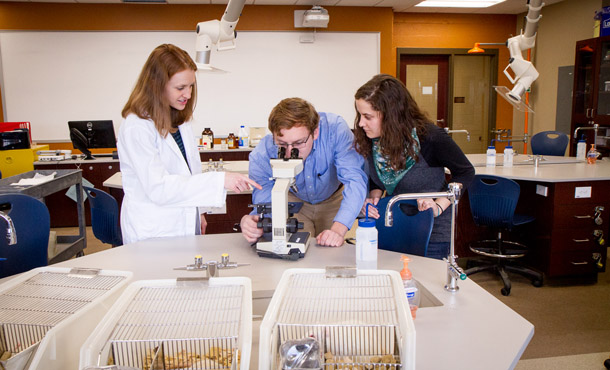If you are among the one in three Americans who suffer from high blood pressure, you know to stay away from salty foods. On the no-go list from your doctor: processed foods such as lunch meat, canned soups or vegetables, or ready-to-eat meals. Yet scientists don’t know why a salty diet causes problems with hypertension.
Julia Halterman, assistant professor of biology at Eastern Mennonite University, intends to learn more with the help of a $100,000 grant from the Jeffress Trust Award Program in Interdisciplinary Research. The grant, awarded to full-time faculty members hired within the past seven years at Virginia colleges and universities, supports “one-year pilot studies that encourage the development of innovative interdisciplinary strategies.” Ten projects received funding during the 2014 grant cycle.
Halterman joined the EMU faculty in 2012 after earning a PhD in pharmacology from the University of Virginia. She teaches in the undergraduate biology department and in the graduate-level biomedicine program.
Halterman’s research, which focuses on the effects of a salty diet on organ function at the molecular level, will begin in the spring. She is specifically interested in a protein called NFAT5.
“When salt is applied to cells in a dish, a protein known as NFAT5 is activated to turn on genes that protect cells from damage,” Halterman said. “However, this protein is also known to turn on genes involved in disease.”
Halterman wants to know more about how this effect occurs in living animals rather than cells. She will put rats on different levels of salt diets for six weeks, monitor blood pressure, and measure changes in NFAT5 levels in different organs of the body.
The goal is to “provide insight for future drug development and treatment of hypertension,” she said.
Grant funding will be used to purchase several pieces of high-tech equipment to conduct molecular biology research. The equipment includes a quantitative, real-time PCR (polymerase chain reaction) machine, spectrophotometer, and a special non-invasive device to measure rat blood pressure, all of which will also be used by students in upper-level courses at EMU.
Other grant funds are designated to hire student assistants. This summer, senior biology majors Rachel King and Jason Spicher will receive stipends to work alongside Halterman. “In future semesters, both undergraduate biology students and graduate biomedicine students will be recruited to continue the research with the samples generated this summer,” Halterman said.
The research project will take advantage of EMU’s newly renovated labs and animal facilities. Suter Science Center, built in 1968, is currently undergoing the final phase of a $7.3-million lab renovation project, with efforts underway to raise an additional $3.3 million for renovations to the western wing of the building.
The renovated building includes state-of-the-art facilities for EMU’s three-year-old graduate program in biomedicine. A member of the program’s leadership team, Halterman instructs many of graduate-level courses, including “Human Gross and Microscopic Anatomy,” held in the cadaver dissection lab.
Halterman earned a bachelor’s degree in biology from Texas A&M University in 2006 and a master’s in biological and physical sciences from the University of Virginia in 2008.
